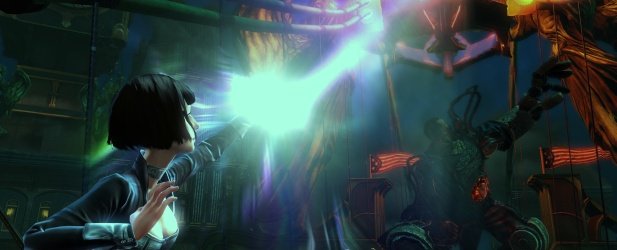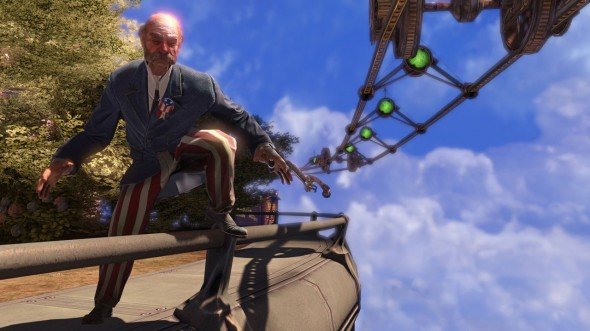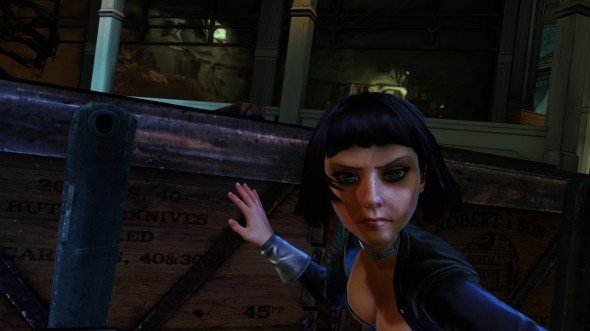Bioshock Infinite preview: cheery, sunny, and unsettling

My first glimpse of Columbia, the floating city where Irrational have set their follow-up to BioShock, is of a sneering caricature of a Mexican face, reminiscent of racist US propaganda from the turn of the last century. Then the camera pans to a similarly twisted Asian face. Finally, it pulls back to reveal that we're looking at a mural of a heroic George Washington, chin up, perfectly lit, surrounded by these sketchily drawn foreigners. Below it, the words 'It Is Our Holy Duty to Guard Against The Foreign Hordes.'
Columbia is more than just a city: it's a floating World's Fair, travelling from country to country on vast hot-air balloons, a shining example of American endeavour. Beautiful colonial buildings hang in the void, tethered to each other by travel rails, parting clouds as they glide. It looks peaceful, but it's a façade. Following an unexplained international incident, Columbia's true nature is revealed. As Irrational's creative director Ken Levine puts it: “it's a DeathStar.” Columbia disappears up into the sky, and becomes a twisted symbol of what it once was. Years pass, countries fear its arrival, but it remains hidden from public view. Like Rapture, the ocean-floor hugging art-deco neighbourhood from the original BioShock, Columbia is another city cut off from the world, a place where an idea has festered, infecting the population. Here, American exceptionalism has twisted into evangelical xenophobia.

It is 1912, years after the city vanished above the clouds. You're Booker DeWitt, a disgraced former Pinkerton Agent (19th century detectives and skull crushers). He's been asked to find a missing woman, Elizabeth. She's in the sky. She's on Columbia.
Same but different
At the game's announcement event in New York, I asked Ken Levine how all this fits into an Ayn Randian world of Big Daddies, crushing fathoms of water and notions of free will? How can this possibly be the same universe that the original BioShock was set in?
“There are two things we think are essential to a BioShock game,” he said. 'Put away all the things with Splicers and Little Sisters and all these... they're important, and in Rapture they were important to BioShock, but they weren't the centre. The centre was being in a world that is amazing and weird and strange and fantastical, but also grounded in the human experience and believable, and then exploring that world.
“The second thing is having a huge suite of tools and a huge range of problems coming at you, and you determining how to deal with these problems with your set of tools. To make a game and have those things – and we weren't done with those ideas – and to put it in another city and not have it be a BioShock game would not be, I think, really honest.

“It is a BioShock game. BioShock has never been about Rapture, it's been about those two core ideas.”
The biggest gaming news, reviews and hardware deals
Keep up to date with the most important stories and the best deals, as picked by the PC Gamer team.
So while there are plasmid-like powers and metallic, groaning beasties to fight, Infinite is looking like a clean slate on which to write 'fuck everyone' over and over and over again.

